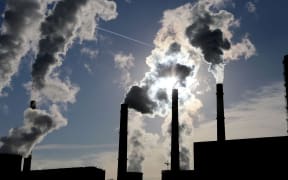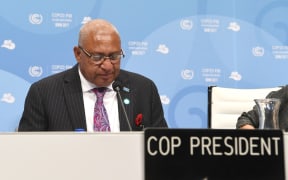Pacific delegates to the latest climate talks in Poland are aiming to galvanise political will to halt global temperature rise at 1.5 degrees celsius.
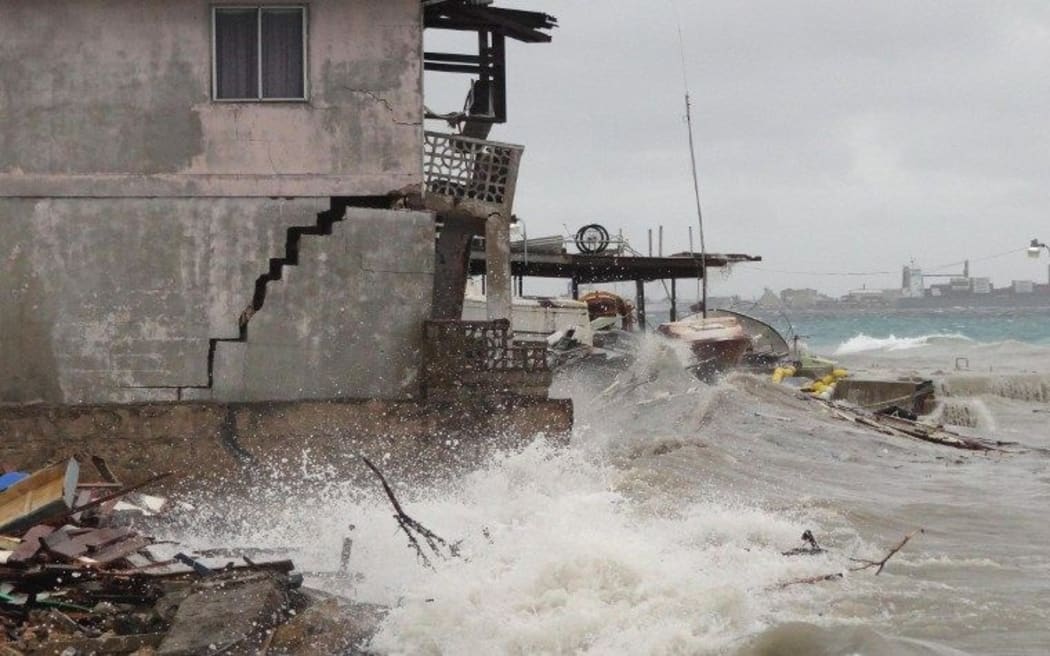
A storm batters Majuro in Marshall Islands in July 2015 Photo: AFP/Giff Johnson
They are among delegates from 200 countries at the 24th Conference of Parties (COP24) UN climate summit in Katowice trying to limit global greenhouse gas emissions and avert climatic disaster.
Political agenda has always been the main barrier at the climate summits, according to the head of the Cook Islands climate office, Wayne King, who said his job would be easier now the science community had reached consensus.
"There is no argument over what is actually happening to the global atmosphere," he said.
"We now have basically got the world's scientists in unison saying we've got some real issues that we need to deal with."
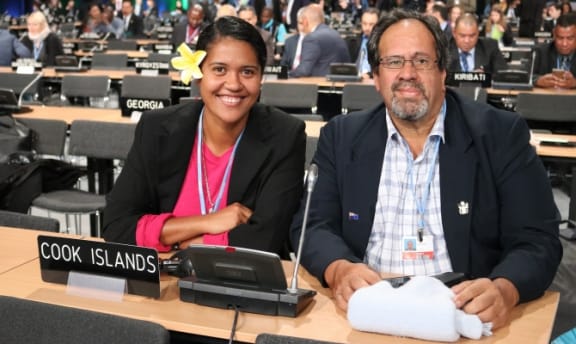
Wayne King and Rima Moeka’a at the UN Climate Change conference in Katowice, Poland. Photo: SPREP
The continued risks for disaster were outlined in October in the Special Report on Global Warming.
The report from the Intergovernmental Panel on Climate Change (IPCC) featured agreement from scientists that the 2015 Paris Agreement's two degrees warming limit is no longer tenable and would significantly impact life as we know it.
The issues are huge and complex, not least that global temperature rise is currently on track to increase four degrees by this century's end. Unabated, it would mean the collapse of the West Antarctic and Greenland ice shelves and a sea level rise of six to eight metres in the coming centuries.
That would mean the end of many Pacific countries.
Keeping temperature rise to the Paris Agreement's two degrees limit would mean a drastic increase in efforts to curb emissions, a tripling of the world's current voluntary commitments known as Nationally Determined Contributions (NDCs).
Holding temperature rise to 1.5 degrees requires an increase of five times the current pledges.
Deputy director general of the Pacific Community (SPC) Cameron Diver said the IPCC report outlined a pathway to achieving the more ambitious limit which should inform every aspect of negotiations at COP24.
"We really have to get back to that 1.5 degree target," said Mr Diver said.
It will take a "paradigm shift" in the way the world operates but there is evidence it is possible, he said.
"I think it's incumbent on us [the Pacific] to help the global community understand the urgency of actually acting.
"Pacific Island countries are showing a huge amount of leadership here in carrying a message about effects that they've had very little to do with but actually they're the first victims of," he said.
"The Marshall Islands is the first country that has officially submitted a new more ambitious Nationally Determined Contribution and it's probably one of the countries that has contributed least to global warming."
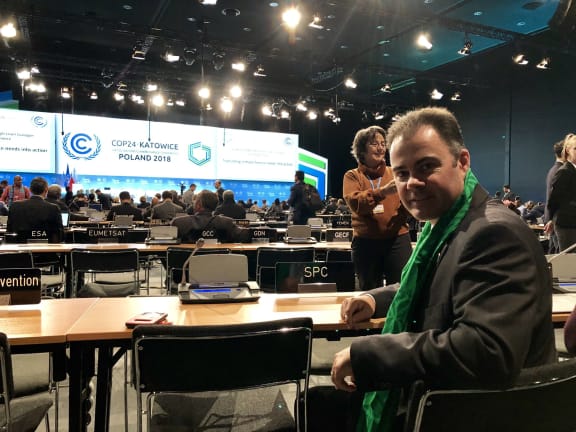
Pacific Community deputy director general Cameron Diver at COP24. Photo: Pacific Community
Political pressure needs to ramp up outside formal negotiations like COP24, Mr King said, like that applied by recent climate action rallies staged by Australian school children.
"I think that needs to continue and increase to put political pressure on those that are, let's say, unwilling to listen further."
Mr King's allusions to Canberra's reticence were echoed by the head of the Pacific Regional Environment Programme (SPREP).
While he didn't wish to name Australia directly, Kosi Latu said there were a number of wealthy countries still involved in coal production which were migrating away to renewable resources.
"Even Poland is a key coal producer but I know that they've been talking about transitioning from a coal based economy to something a bit more sustainable," Mr Latu said.
Across Australia, an estimated 15,000 people protested over the weekend at Indian mining giant Adani's plans to self finance the controversial Carmichael coal mine in Queensland.
The call to the Australian government to stop the mine has so far fallen on deaf ears.
Meanwhile, the agenda at COP24 this week, beyond agreeing the revised limit of 1.5 degrees, is set around the rule book for achieving it. The rule book will determine ways that a country's NDCs are agreed, monitored and adhered to in order to achieve a cleaner future.
Mr Latu said this was an imperative for the summit as time was running out.
Pacific delegates are also trying to free up climate finance in the form of grants rather loans.
Mr Diver said climate finance needed to empower efforts to adapt to a changing climate, not trap countries in debt.

SPREP Director-General, Kosi Latu. Photo: RNZI / Sally Round
Funds needed to be easier to access for Small Island Developing States, he said.
"It would be extremely positive to see an increase in the amount of grant funding that is available to developing countries," Mr Diver said.
"In particular our island nations so that they can meet their adaptation targets.
"The costs of adaptation, if we look at it from just a loan perspective, are already starting to become unsustainable," he said.
Meanwhile, the Pacific Islands Forum Secretariat is calling for a scaling up of climate finance at COP24.
The secretariat said its goal was an increase in funding that would help member countries adapt to and mitigate the effects of climate change.
It also wants simplified access for its members.
Developed nations have already committed $US100 billion per year by 2020 but there are conditions.
Climate vulnerable nations say finance in the form of loans instead of grants re-victimises nations which have contributed the least to climate change.
The Forum Secretariat will seek increased contributions from developed nations and through the Kyoto Protocol's Adaptation Fund.


